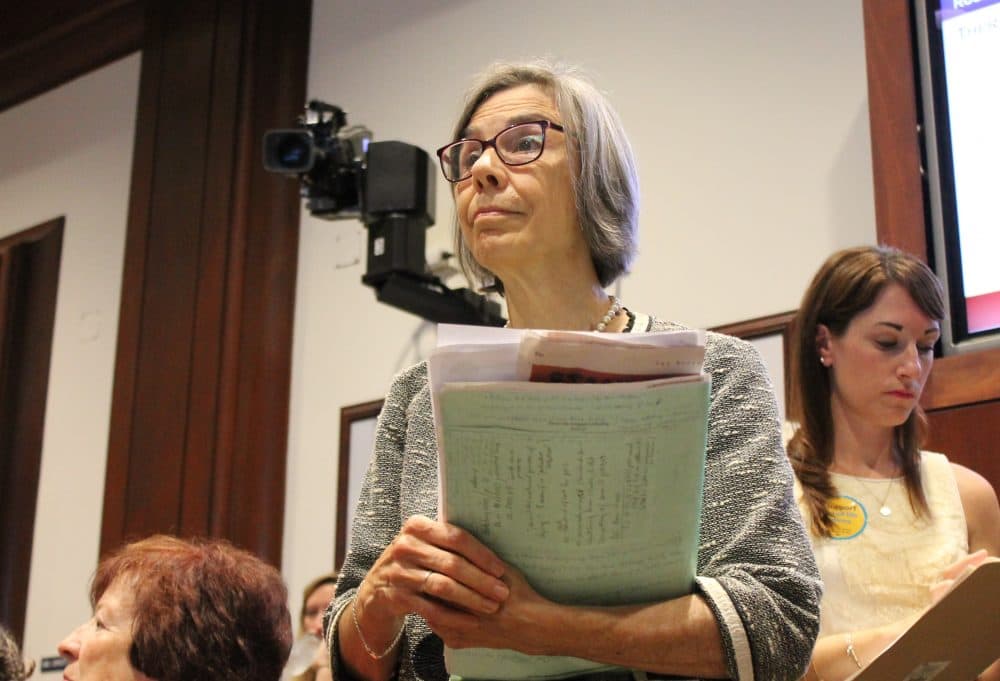Advertisement
First Refusal Bill Pitched As Way To Empower Tenants

Rep. Denise Provost lives on a leafy street in Somerville, where real estate is booming, and she regularly receives offers in the mail from investors hoping to buy her home.
"I've got a file upstairs that's stuffed with letters that my husband and I get every week, offering to buy our house, sight-unseen; they'll pay all the closing costs; no hassle," Provost told the News Service.
Provost has also heard from Somerville renters who have been essentially powerless to stop an investor from buying their building and evicting them.
Seeking to empower apartment-dwellers, Provost filed legislation (H 3017) that would give tenants in multifamily housing the right to first refusal when their building goes on the market and enable them to partner with a nonprofit to take on responsibilities of ownership and the purchase cost.
"Tenants, residents feel under siege. They are being displaced. It is a public health crisis, because that's how I view displacement. It is destabilizing and devastating families, communities -- it has a residual impact on our workforce, our economy," Boston City Councilor Ayanna Pressley told the News Service after testifying for the bill before the Housing Committee. "So I'm looking for anything that gives the power back to tenants who are feeling powerless."
"Tenants, residents feel under siege. They are being displaced. It is a public health crisis, because that's how I view displacement."
Boston City Councilor Ayanna Pressley
Real estate industry representatives worry how inserting a new process into real estate transactions might impact the market, which is already tight.
"We've got a lot of questions on how this would really work," said Greg Vasil, CEO of the Greater Boston Real Estate Board. If the policy was adopted in Boston and the developer that owns the Prudential Tower wanted to sell it "do they have to go through this process with the tenants that live there?" Vasil asked. "I think they might."
Supporters of Provost's bill, which has 10 legislative cosponsors, say it is similar to a Washington, D.C., law dating back to 1980 that they say has been successful, giving tenants more control over where they live. Owner-occupied buildings, single families and duplexes would be excluded from the tenants' right to purchase, under the bill. The bill would also establish a local-option so cities and towns would need to adopt it locally for it to take effect.
Tenants would need to pay fair market value, which would be a big lift for many living in the Greater Boston real estate market, but the bill would also enable them to assign the right to purchase to a nonprofit, community land trust or owners' cooperative, according to a fact sheet. Tenants would have 45 days after notice of a pending sale to make a deposit on the property and then another 120 days to secure financing and close on the purchase, according to the fact sheet.
While NAIOP, the Commercial Real Estate Development Association, opposes the bill according to its CEO, Vasil said the Real Estate Board has yet to take a firm position on it.
"It's very unlikely that we will be supportive," Vasil told the News Service. He said his group supported allowing affordable housing groups the right to first refusal to ensure affordable housing units remained affordable and said that law has been a success, but establishing a similar process for market-rate buildings opens up new questions.
"This could potentially tie transactions up in knots for a very long time," Vasil told the News Service.
The cost of housing is the top concern of Boston voters, according to a recent WBUR/MassINC poll. The median price of single-family homes in Massachusetts rose for the 17th straight month in August, reaching $379,000, according to the Warren Group.
"We must be bold and we can't just nip around the edges," Somerville Mayor Joe Curtatone told the committee. "We are losing the battle. We are getting overrun."
While Curtatone and others expressed concern about sales forcing residents out of communities, Rep. David DeCoste, a Norwell Republican, said he is concerned the bill would enable tenants to interfere in the sale of a property from a father to a daughter.
"You're basically usurping some prerogatives of ownership," DeCoste told proponents. He said, "This could essentially take property that families have worked on forever -- you know, for generations -- out of the family."